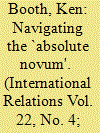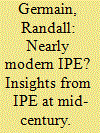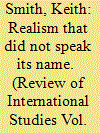| Srl | Item |
| 1 |
ID:
085426


|
|
|
|
|
| Publication |
2008.
|
| Summary/Abstract |
This article situates John Herz's work within the perennial debate about realism and idealism, and the issue of whether and how the two sets of ideas can be reconciled. The variety of `realist' and `idealist' concepts and conceptualisations within Herz's work, and his attempt to combine them in an approach he called `Realist Liberalism', reveals the inadequacy of the addiction of many teachers and researchers in academic international relations to stick unhelpful labels on theorists (such as `Realist') who advance complex and sometimes apparently contradictory intellectual positions. Placing Herz's work alongside other theorists who have grappled with the relationships between realism and idealism - notably Carr and Rawls - the article argues for categorising ideas and not individuals. More importantly, a case is made for the continuing validity of seeking to comprehend IR in terms of the interplay of idealism and realism, and for greater recognition of Herz's contribution to it.
|
|
|
|
|
|
|
|
|
|
|
|
|
|
|
|
| 2 |
ID:
180352


|
|
|
|
|
| Summary/Abstract |
Disciplinary debates within IPE often leave as an open question how contemporary scholars may build on and incorporate insights from its rich intellectual history. In this article I examine the work of three scholars who are rarely grouped together, but who should be recognised today as engaged in an IPE-inflected debate: Karl Polanyi, E. H. Carr, and David Mitrany. They advanced distinct IPE-centred ways of framing the central problems of the post-1945 world, which are remarkable for how they prefigure important themes in modern IPE scholarship. By assembling and considering their work collectively, I make two arguments: (1) we should recognise their contributions as a precursor to modern IPE; and (2) their work, with certain caveats, provides valuable intellectual resources for contemporary scholars. Their combined work should be considered as part of the common heritage of IPE.
|
|
|
|
|
|
|
|
|
|
|
|
|
|
|
|
| 3 |
ID:
153258


|
|
|
|
|
| Summary/Abstract |
E. H. Carr was one of Europe’s pre-eminent thinkers in the field of international affairs. Yet his contribution to International Relations theory is continually questioned. Realists depict Carr as a quintessential realist; revisionists draw from his wider corpus to qualify his contribution. Although not inaccurate, the revisionist literature is incomplete as it neglects a number of Carr’s diplomatic histories. Refocusing on these, especially the manner in which traces of Ranke’s ‘the primacy of foreign affairs’ tradition is evident, this article points to a more conservative and less critical Carr. Utilising an interpretivist framework, this shift in traditions of thought is explained by the dilemmas Carr faced. Although works of history rather than theory, the article contends that Carr’s diplomatic histories remain relevant, particularly with regard to the embedded criticism of realpolitik they contain. This realisation is made evident through a reading of Carr in parallel with the concept of tragedy.
|
|
|
|
|
|
|
|
|
|
|
|
|
|
|
|